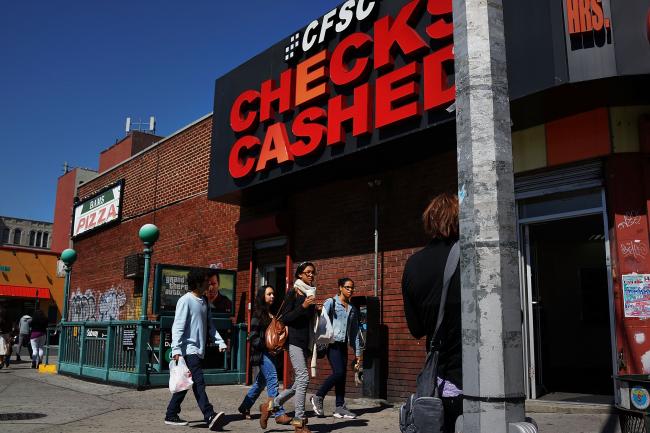(Bloomberg Opinion) -- Unlike the bond market, which is largely anchored in economic reality, the stock market is based on hope. Everyone knows and understands that, but it’s still next to impossible to reconcile the latest leg higher in equities — which has pushed the Dow Jones Industrial Average, S&P 500 Index and Nasdaq Composite Index to records — with the latest economic data.
Consider Friday, when all those benchmark indexes posted their biggest gains of the week even though a Commerce Department report showed that retail sales in October failed to rebound enough to offset concern about September’s horrible numbers. That was enough to spur JPMorgan Chase (NYSE:JPM) & Co., which as the largest U.S. bank should know a little something about the economy, to cut its fourth-quarter estimate of gross domestic product to a meager 1.25% from what was an already low 1.75% on an annualized basis.
But none of that matters to the stock market, which has tied its belief in an upswing in the economy to every comment made by U.S. and Chinese officials on “phase one” of a trade deal. The problem is that no one truly knows what it will contain or accomplish. White House economic adviser Larry Kudlow told reporters late Thursday in Washington that “we are coming down to the short strokes” and are “in communication with them every single day.”
And here’s where hope comes into play for the stock market. The hope is that unlike in the past, when the White House signaled that a deal was at hand, this time will be different. If it is, that might east the uncertainty hanging over business leaders, ignite faster growth and allow companies to meet earnings estimates for 2020 that remain stubbornly high at just less than 10%.
This wouldn’t be much of a concern if stocks were cheap, but they’re anything but. The S&P 500 is trading at 17.2 times the following year’s projected earnings. That ratio has been higher only once since the economy began to recover from the financial crisis, and that was during late 2017, just before the S&P 500 tumbled 10% over the course of a few weeks in late January and early February 2018.
Put another way, all the good news that equity investors are anticipating is already reflected in stock prices — and then some. Proof for that comes in the widely followed monthly survey of fund managers by Bank of America Merrill Lynch (NYSE:BAC). The latest results were released last Tuesday and showed that a net 6% of those polled expect a strong global economy next year, compared with negative 37% in September’s survey. That was the biggest month-over-month jump on record.
But that came before the retail sales report, which should provide plenty of reason for pause heading into the holiday season. Sales in the “control group” subset, which some analysts view as a more reliable gauge of underlying consumer demand, increased 0.3% as projected, but the September figure was revised to a decline of 0.1% from no change. That was the fourth consecutive month this series was revised lower. “We’re more dependent on the consumer than ever in this expansion, and we’re getting some signs the consumer is slowing” Stephen Gallagher, chief U.S. economist at Societe Generale (PA:SOGN) SA, told Bloomberg News.
Although the bond market is no longer pricing in an imminent recession, it hasn’t exactly embraced the “all is fine” narrative like stocks have. Yields on U.S. Treasuries average 1.77%, which is in the middle of the 1.51% to 2% range they have been stuck in since July. And don’t forget, those yields averaged 3% this time last year.
The phrase “priced for perfection” gets tossed around a lot by investors. This time, it feels appropriate given how much hope is priced into stock prices.
